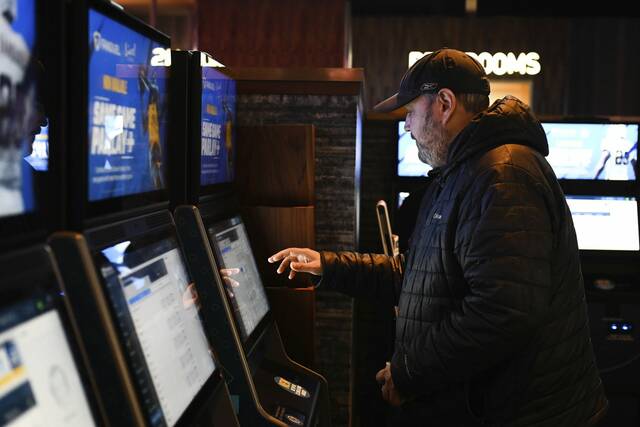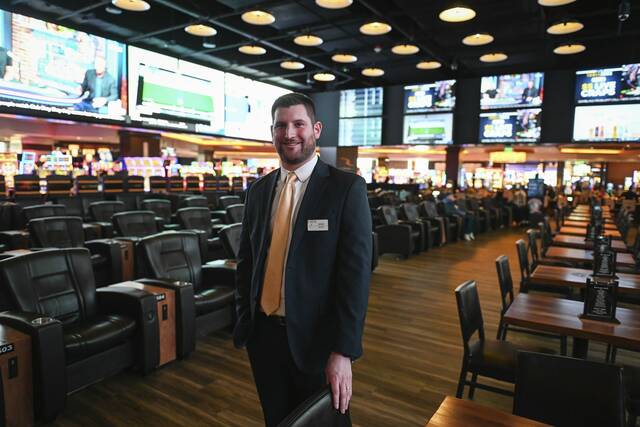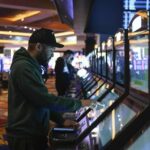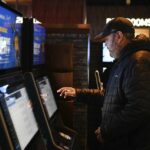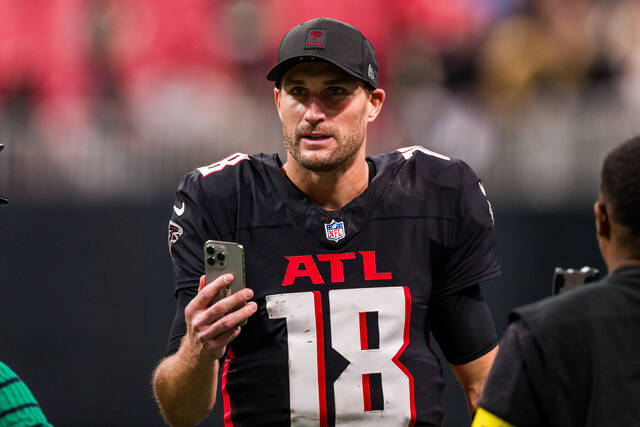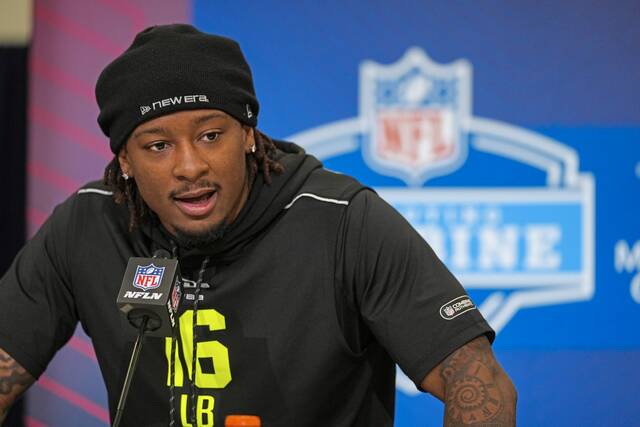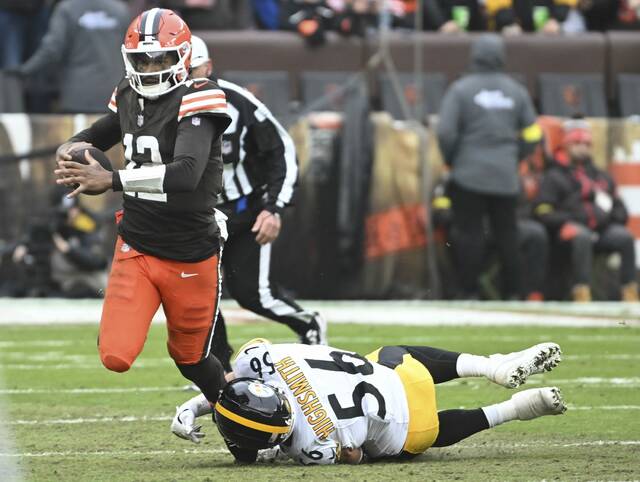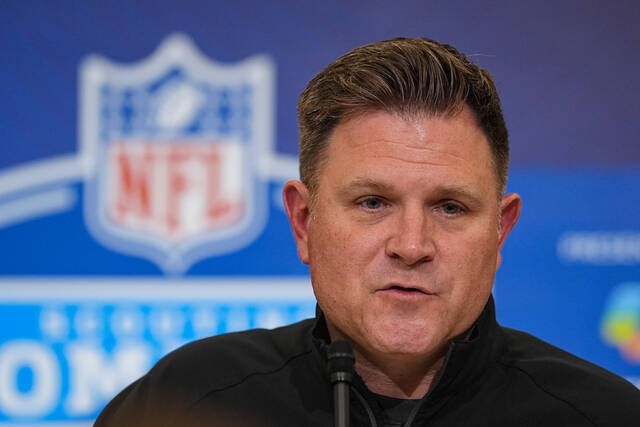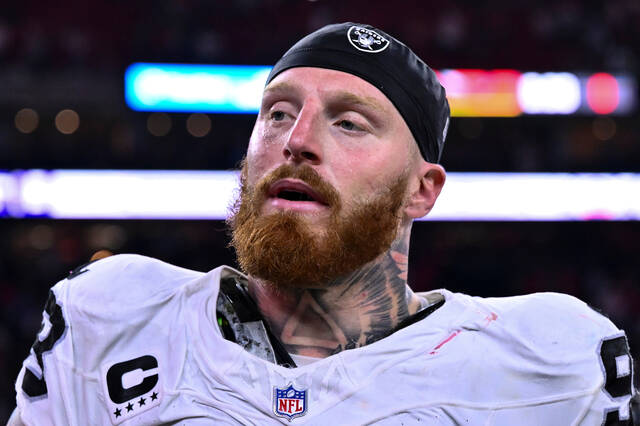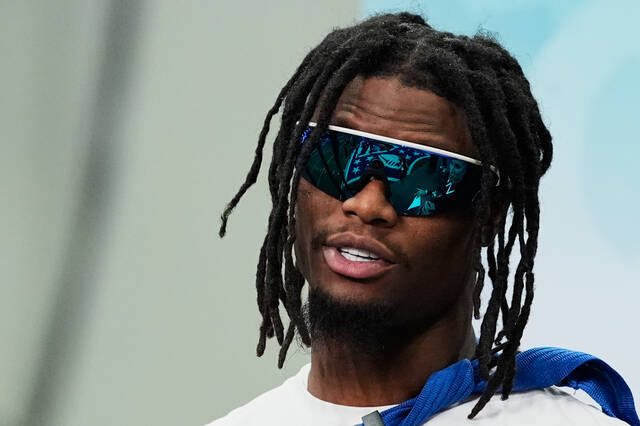After decades of treating gambling like a pariah, the NFL has pushed all of its chips into the center of the table.
The league is all in when it comes to Las Vegas — the world’s gambling mecca and host city of Super Bowl LVIII — and partnerships with sports betting companies. Proof will come at 6:30 p.m. Sunday when the game kicks off at palatial Allegiant Stadium, next to the famed Strip.
“It’s something I thought I never would see,” said Jimmy Vaccaro, the 78-year-old Trafford native and legendary oddsmaker.
The game between the San Francisco 49ers and Kansas City Chiefs is the first Super Bowl to take place in Sin City. Given the wealth created by the marriage between the NFL and its gambling partners, it almost certainly won’t be the last.
Industry experts project $1.3 billion will be wagered legally on the Super Bowl, a 20% increase from 2023.
Legally is the key word. In all, the American Gaming Association predicts that bettors will wager about $23.1 billion, up from $16 billion last year. That includes office pools, squares contests and casual wagers.
The NFL will pull in $132 million this season from its gambling partnerships, according to the Washington Post.
Despite years of full-throated opposition to legalized sports gambling, the NFL has embraced sportsbooks, from BetMGM and Caesars to FanDuel and DraftKings. It even has permitted sportsbooks in some NFL stadiums.
‘That decision changed everything’
The 2018 Supreme Court decision overturning the Professional and Amateur Sports Protection Act (PASPA) changed everything. PASPA was enacted in 1992 and outlawed sports betting for much of the nation, excluding Nevada.
The high court’s ruling paved the way for states to legally accept wagers on sporting events. That meant, from a gambling perspective, that whatever happened in Las Vegas no longer had to stay there.
Since that ruling, 38 states and Washington, D.C., have legalized sports gambling.
“Before, if you wanted to place a bet (outside Vegas), you had to do it offshore or through your local bookie,” said Stephen Andress, an advocate for legalized sports betting and editor of industry publication TheLines.com. “That decision changed everything, and it became pretty obvious to the NFL owners that this was a chance to make a lot of revenue.”
The NFL didn’t waste time getting a piece of the action. In 2017, a year before PASPA was overturned, the league approved the relocation of the Oakland Raiders to Las Vegas. The league acted quickly to form partnerships with gambling entities.
In 2018, the first year the league permitted teams to strike marketing deals with gambling entities, the NFL pocketed $35 million from sponsors that ranged from casinos to fantasy football sites, according to research firm SponsorUnited.
Five years later, the gambling-generated income has quadrupled for the league, which has official partnerships with three sports betting companies — FanDuel, Caesars and DraftKings — and an alliance with BetMGM as an authorized operator. Fans can find ads for these companies at practically every televised sporting event, not just the NFL. The Steelers have a partnership with BetMGM.
Bettors can place wagers with the touch of an app on their cellphone and, in some instances, at the very games they are attending. Sportsbooks can be found inside the Washington Commanders’ stadium and adjacent to the Arizona Cardinals’ facility. More are expected to be erected in the coming seasons.
Counting legal wagers and those involving office pools, bookies and offshore operations, 68 million adults will place a bet on the Super Bowl, according to the American Gaming Association. The amount wagered will total $23.1 billion, a $7 billion increase from 2023.
“Gambling now is more mainstream than it ever has been,” Andress said.
Las Vegas remains at the epicenter of the Super Bowl wagers placed legally, albeit barely. About 13% of such bets will come from Nevada, followed by New York at 12.4%. Pennsylvania is fourth at 7.4%, trailing New Jersey in third.
“There was a big fear for a lot of people about what effect (the Supreme Court ruling) would have on Las Vegas,” said Adam Pullen, assistant director of trading at Caesars. “It’s been negligible. Look, Vegas is unique. You can bet sports anywhere, but if you want to have a unique experience, you come here.”
The exposure Las Vegas has received this past week is immeasurable. Still, to some of gambling’s most renowned oddsmakers, Super Bowl LVIII is just another day at the office.
“We’ve always had the Super Bowl in Vegas; it just wasn’t always played here,” said Chris Andrews, a Forest Hills native and Robert Morris graduate who works alongside Vaccaro setting the odds at South Point Casino in Las Vegas. “Maybe there is a bit more big money coming to town, but we’ve had that before.”
The NFL isn’t so cavalier about having the Super Bowl played within a Patrick Mahomes deep pass of the Strip. Following up on protocols he sent to teams and players in September, Commissioner Roger Goodell dispatched a memo Feb. 1 outlining the dos and don’ts of players and nonplayer personnel on site for the Super Bowl.
“With fans across the globe tuning into the game and related events, we must all do our part to protect the integrity of our game and avoid even the appearance of improper conduct,” Goodell wrote.
Players for the 49ers and Chiefs are prohibited from any form of gambling, including casino games. Players from non-Super Bowl participants on hand for the game may “engage in legal gambling” but cannot bet on the NFL or visit a sportsbook until after the game.
The NFL has suspended 10 players for gambling since 2021, including Jacksonville wide receiver Calvin Ridley for the entire 2022 season. Goodell, though, has eased his punishment for players caught betting on non-NFL games at team facilities or at team hotels on road trips. First-time offenders now face a two-game suspension, down from six.
The league also has taken steps to regulate the proliferation of gambling advertisements on its telecasts. A maximum of six commercials per game can be sold to sports betting entities. The NFL also is the largest sports league donor to the National Council on Problem Gambling. According to the Washington Post, the NFL has committed $6.2 million over three years. Other leagues have committed about $50,000 per year.
“You also have to credit the state regulators,” Andress said. “When they legalized sports betting, they dedicated a percentage of the tax revenue to state-funded and state-run problem gambling programs. That didn’t exist before.”
Until this year, neither did a Super Bowl in Las Vegas. Consider that just 21 years ago, the city’s convention and visitors authority tried to buy advertising time during the Super Bowl only to be rebuffed by the NFL because of the perception of possible improprieties.
“The relationship was adversarial,” said Pullen, whose employer, Caesars, is an NFL partner. “Times change. What was taboo is now more acceptable.”
Vaccaro, an inaugural member of the Sports Gambling Hall of Fame in 2023, is among the oddsmakers enjoying the ride.
“Used to be the NFL wouldn’t talk to a bookmaker like me,” he said. “It would be the guy with a cigar in his mouth spitting on the floor, that’s who wanted to talk. Those days are gone.”
‘More to come’
What’s next for the gambling industry as it pertains to the Super Bowl? Plenty of additional revenue, experts say.
Nebraska and North Carolina are on the verge of joining the 38 states and Washington, D.C., that already have enacted legislation permitting sports wagering. Among the states still on the outside are two of the biggest and most populous: Texas and California.
“There is no light at the end of the tunnel for California,” Andress said. “As for Texas, we will see. They’ve had some conversations, and (Dallas Cowboys owner) Jerry Jones has gotten involved.”
Technological advancements not only have made it easier for bettors to place a wager from their cellphones, but they also have increased the menu of potential sports bets. As popular as prop bets — a wager based on how a certain player will perform — have become, other micro-bets remain an untapped entity.
In-game wagering remains in its infancy. That gives bettors the chance to predict what may happen on the next drive of an NFL game or how many runs an MLB team might score in the next inning.
“It’s much bigger in Europe than in the U.S.,” Andress said. “But Europe has had sports betting a lot longer. More and more sportsbooks here are trying to show people they can place a bet in the middle of game and not just before it starts.”
Pullen equates the next phase of sports gambling to a baseball game.
“We might be in the top of the third inning,” he said metaphorically. “It’s young. Yes, we’ve had legal sports betting for five years, and we’ve had legal betting in Las Vegas for 50 to 60 years, but there is so much more to come.”




